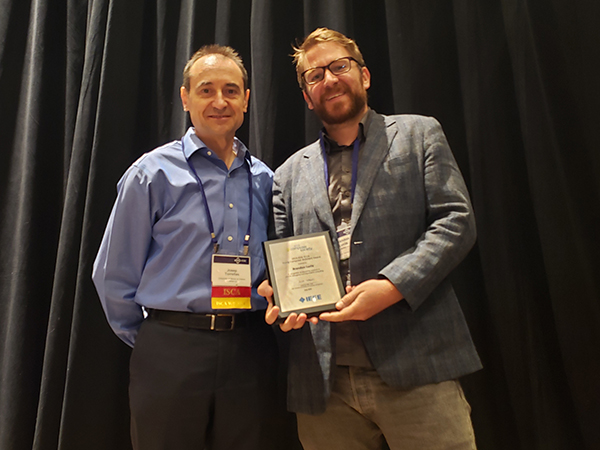
Allen School alumnus Brandon Lucia (Ph.D., ‘13) has been recognized by the IEEE Computer Society’s Technical Committee on Computer Architecture with the 2019 Young Computer Architect Award. This award recognizes an outstanding researcher who has completed their doctoral degree within the past six years and who has made innovative contributions to the field of computer architecture. Lucia, who completed his Ph.D. working with Allen School professor Luis Ceze and is now a faculty member in Electrical & Computer Engineering at Carnegie Mellon University, was recognized for “pioneering research in parallel debugging and intermittent computing.”
Lucia devoted his early research career to the development of novel approaches for concurrency debugging and failure avoidance for parallel and concurrent software such as shared-memory multi-threaded programs. Unlike sequential software, parallel and concurrent software relies on concurrent computations and an ordering of program events that varies with each execution. These qualities make pinpointing bugs a particularly challenging process. In response, Lucia and his collaborators developed a string of techniques that blended computer architecture and systems support to make it easier to find and fix concurrency bugs and minimize the risk of schedule-dependent failures that tend to erode system reliability. He was among the first researchers to devise mechanisms for automatically avoiding such failures ― typically the result of latent concurrency bugs discovered only after software is put into production ― without altering program semantics. His contributions include Atom-Aid, which capitalizes on the natural tendency for systems with implicit atomicity to prevent some schedule-dependent failures; ColorSafe, a scheme for applying colors to groups of data that makes it easier to avoid multi-variable atomicity violations in programs; and Aviso, a software system for automatically avoiding schedule-dependent failures by generating schedule constraints that disrupt the order of events based on historical failed executions.
Since his arrival at CMU, Lucia and his students in the Abstract Research Group have focused on the development of intermittent computing, including the design of software and hardware systems for addressing reliability issues and energy storage needs in battery-less devices. This rapidly growing area of research focuses on enabling computation, sensing, and communication with devices that harvest ambient energy to power their operations for a variety of real-world ― and out-of-this-world ― applications in potentially extreme environments. To advance this burgeoning technology, Lucia led a team of researchers in developing a new energy storage architecture, Capybara, that can be dynamically reconfigured in response to varied applications’ energy demand. Their work earned the Best Paper Award at ASPLOS 2018 and an Honorable Mention in IEEE MICRO’s Top Picks last year. Other contributions include Chinchilla, a compiler and run-time system for supporting the efficient, intermittent operation of energy-harvesting devices through adaptive dynamic checkpointing, and the Energy-Interference-Free Debugger (EDB), a tool for monitoring and debugging intermittent systems without adversely impacting their energy state that was selected as an IEEE MICRO Top Pick in 2017.
Lucia collected his latest accolade at the 46th International Symposium on Computer Architecture (ISCA 2019) this week in Phoenix, Arizona. He is not the first with an Allen School connection to earn the Young Computer Architect Award since its inception in 2011. Last year, fellow 2013 alumnus Hadi Esmaeilzadeh was recognized for his contributions to novel computer architectures in machine learning and approximate computing, and their mentor Ceze was recognized in 2013 for his work on improving multi-core programmability and correctness.
Congratulations, Brandon!

